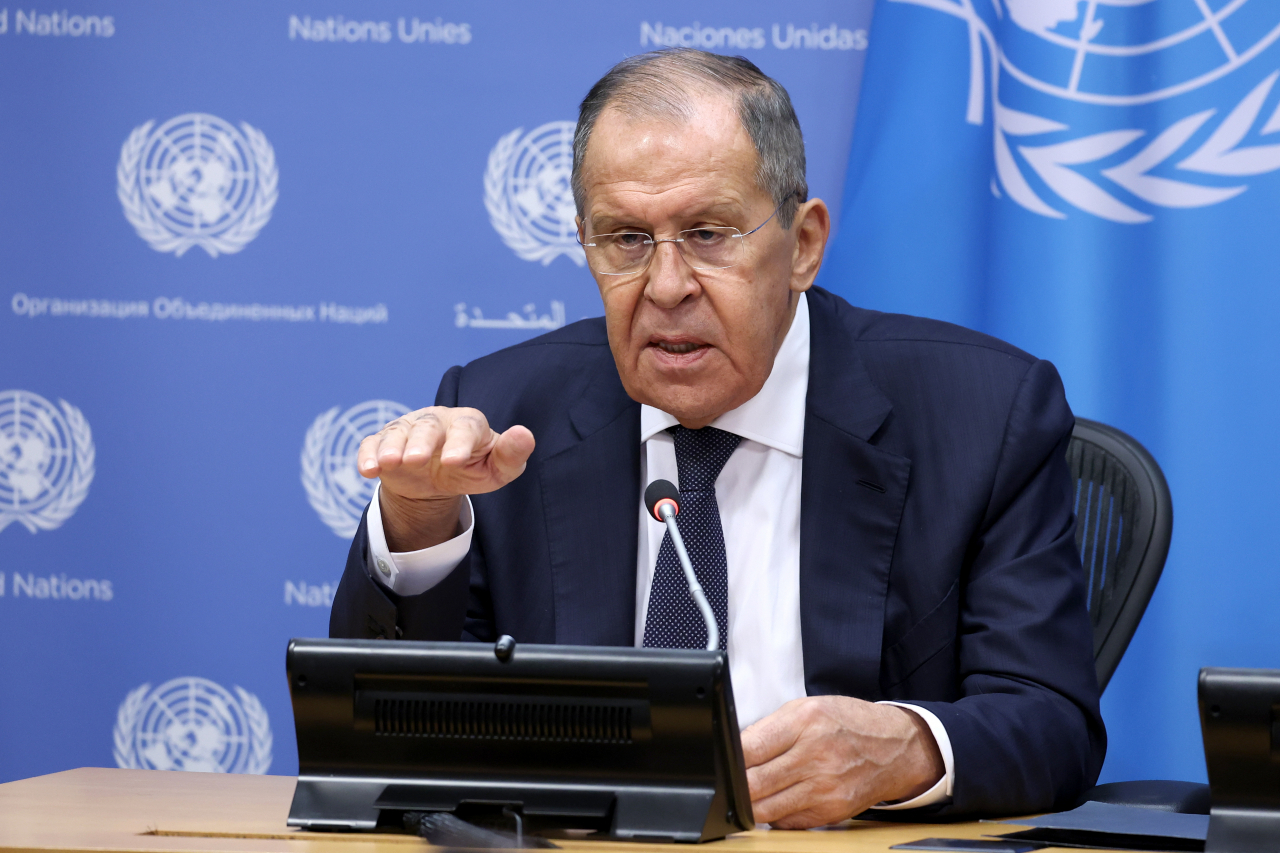 |
Russia's Minister of Foreign Affairs Sergey Lavrov speaks during a press conference at the 78th session of the United Nations General Assembly at UN Headquarters in New York on Saturday. (TASS-Yonhap) |
Russian Foreign Minister Sergey Lavrov announced plans for an October visit to Pyongyang following the North Korea-Russia summit earlier this month, intensifying speculation about increased military cooperation between the two nations.
"In accordance with the decision of (North Korean leader) Kim Jong-un and (Russian President Vladimir) Putin, we will arrange my talks in Pyongyang, which may indeed take place next month," Lavrov was quoted as saying by Russian news agency TASS during a press conference after the annual United Nations General Assembly on Saturday.
Lavrov's remarks reaffirm the Kremlin's statement that Putin's potential visit to North Korea -- the first since the Kim Jong-un regime began in 2011 -- will follow Lavrov's expected visit to Pyongyang in October to meet his North Korean counterpart, Choe Son-hui.
Kremlin spokesperson Dmitry Peskov said on Sept. 14 Kim invited Putin to visit North Korea and Putin "gratefully accepted" the invitation, calling the high-level talks between Pyongyang and Moscow "very, very constructive."
During Kim's visit to Russia from Sept. 12-17, Kim reportedly invited Putin to visit North Korea "at a convenient time," according to Pyongyang's state-run Korean Central News Agency, and Putin "accepted the invitation with pleasure."
Saturday's confirmation of the visit to North Korea stands in contrast to a similar situation four years ago, when potential high-level talks in Pyongyang reported by KCNA did not come to fruition following the summit between Kim and Putin in Russia.
Lavrov, meanwhile, noted in a speech at the UN General Assembly on Saturday that the building of ties between South Korea, Japan and the United States from the outset of the trilateral summit at Camp David has left the Korean Peninsula unsettled, and that Washington is to blame for the circumstances.
"It is alarming that Washington and its Asian allies are whipping up military hysteria on the Korean Peninsula, where the strategic potential of the US is accumulating," he said.
"Russian and Chinese initiatives to give priority to humanitarian and political tasks are rejected."
Top diplomats of South Korea, Japan and the United States denounced the possible arms deal between the two isolated countries, amid converging needs that could be mutually fulfilled. Russia is reportedly running out of ammunition to sustain the prolonged war with Ukraine, while North Korea has largely been lackluster in its progress to achieve its military ambitions, such as the launch of a space satellite for military purposes.
South Korea's Foreign Ministry said in a statement Saturday that Foreign Minister Park Jin briefly met with US Secretary of State Antony Blinken and Japanese Foreign Minister Yoko Kamikawa during his trip to New York, and warned that any potential arms deal between Pyongyang and Moscow would be in violation of UN Security Council resolutions that Russia itself voted for.
China, another UN Security Council member nation, appears to have kept its distance from the talks between North Korea and Russia.
First Vice Foreign Minister Chang Ho-jin on Saturday said in Hangzhou, China, that, during the talks between Prime Minister Han Duck-soo and Chinese President Xi Jinping that lasted for about 30 minutes, the matters of North Korea-Russia ties were "barely mentioned."
Chinese Foreign Ministry spokesperson Mao Ning said on Sept. 12 that Kim’s visit to Russia "is something between their two countries." She added that she "(doesn't) have anything to share" about the possible high-level meeting between North Korea and China, while Putin on Wednesday accepted Xi's invitation to visit China in October.






![[Today’s K-pop] Blackpink’s Jennie, Lisa invited to Coachella as solo acts](http://res.heraldm.com/phpwas/restmb_idxmake.php?idx=644&simg=/content/image/2024/11/21/20241121050099_0.jpg)
